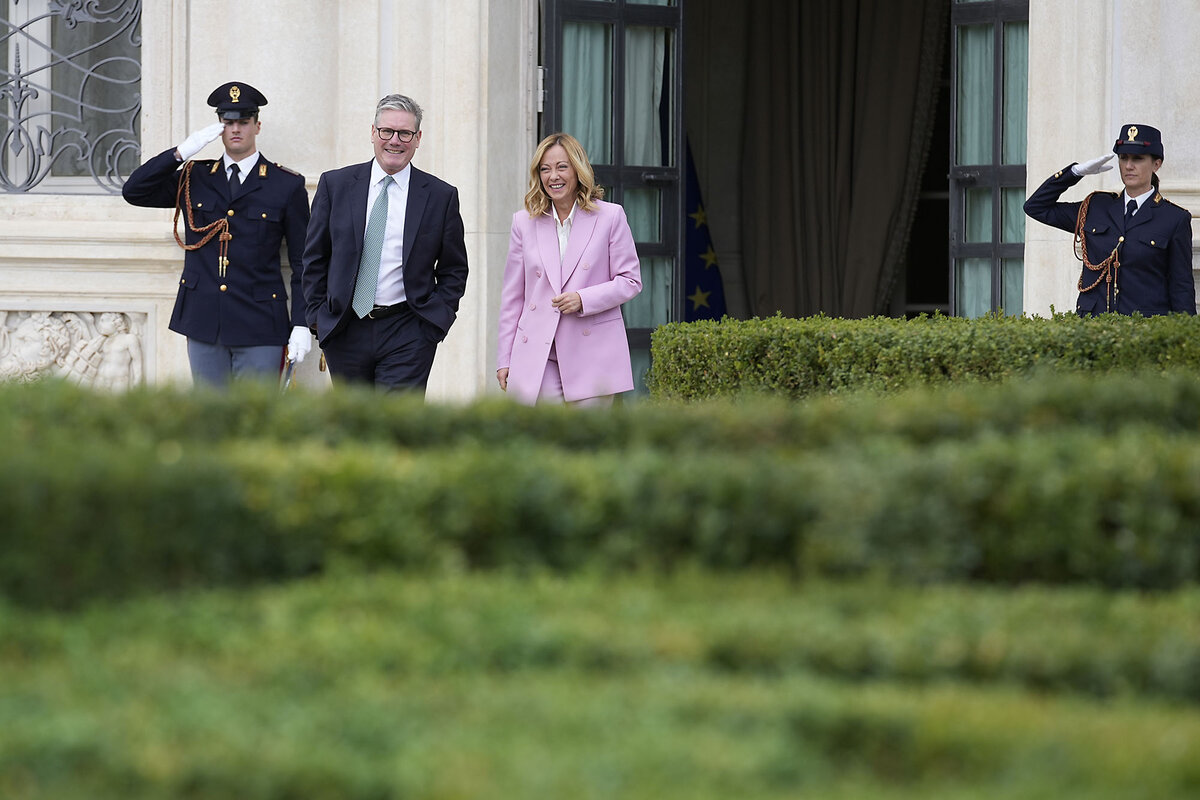Pressed by far right, European governments raise barriers to migrants
Loading...
| London
Country by country, Europe is toughening its treatment of foreign migrants. And while the politics behind the shift are crystal clear, the implications for the Continent’s cohesion, cooperation, and future growth are looking much murkier.
The political impetus comes from recent electoral gains by right-wing nationalist parties such as Marine Le Pen’s National Rally in France, the Reform UK party in Britain, and the Alternative für Deutschland (AfD) in Germany.
Quite apart from concerns about what the hardened approach will mean for asylum-seekers’ human rights, the new measures could strain the unity of the 27-nation European Union.
Why We Wrote This
“We can do this,” former German Chancellor Angela Merkel said of her welcome to over a million Syrian refugees in 2015. Today, Europe’s message to migrants is, “We won’t do this.”
And there’s an ironic twist: As Europe’s population ages, many countries need immigrant workers to provide the tax base to pay for government services and sustain growth.
With tens of thousands of asylum-seekers every year jeopardizing their livelihoods, even risking their lives, to reach Europe, far-right parties have been stoking fears of a repeat of the much larger influx that followed former German Chancellor Angela Merkel’s 2015 welcome to hundreds of thousands fleeing the war in Syria.
Until recently, the EU felt confident it had come up with an agreed-upon joint strategy.
It involved strengthening the bloc’s external borders, and funding governments on the other side of the Mediterranean Sea to keep a lid on refugee crossings, while still accepting significant numbers of migrants and sharing the financial burdens and resettlement among member states.
Now, however, there is a stark shift toward individual national action.
And the most recent moves are not by right-wing governments. They’re from the center-left leaders of Europe’s three main economic powers: France, Britain, and Germany.
French President Emmanuel Macron has backed tougher residency and employment rules for immigrants, and weaker appeal provisions for asylum-seekers, broadly in line with Ms. Le Pen’s policy platform.
In Britain, new Prime Minister Keir Starmer headed to Rome this week, declaring himself eager to learn from the experience of Italy’s right-wing Prime Minister Giorgia Meloni in reducing the number of asylum-seekers.
Ms. Meloni has relied on deals with the authoritarian leaders of Tunisia and Libya, underwritten by hundreds of millions of dollars in EU aid, to crack down on Mediterranean crossings.
Mr. Starmer also showed interest in the deal she has done with Albania, to build a processing facility where migrants seeking asylum in Italy will be detained until their status is decided.
That approach could prove controversial within Mr. Starmer’s own Labour Party. One of his first acts as prime minister was to shelve a plan by the previous Conservative government to fly asylum-applicants from Britain to Rwanda – a scheme blocked by Britain’s Supreme Court.
Still, it is the German government that has taken the most striking, and potentially impactful, step.
Against the background of AfD successes in two state elections, and the prospect of victory in a third state poll next week, Chancellor Olaf Scholz reintroduced checks at all Germany’s land-border crossings, with the declared aim of turning back any asylum-seeker who had already sought refuge in another EU country.
These frontier controls fly in the face of one of the European Union’s proudest achievements – borderless travel across the entire bloc, from Poland to Portugal.
And with other EU states voicing their concern, it remains to be seen whether Mr. Scholz will keep the border checks in place beyond their initial six-month term.
But the more daunting challenge for European leaders may be to find a way to move beyond the immediate far-right political pressures and agree to sustainable, longer-term policies on immigration and asylum.
The latest figures actually show an overall fall in the numbers of asylum-applicants reaching European shores this year.
Still, EU leaders have long recognized there are real, practical problems they must address, such as inadequate external border security and overtaxed facilities to receive, lodge, investigate, and process the often destitute and desperate new arrivals.
In many countries, the authorities have also failed to integrate migrants into local society. That has proved a dangerous weakness when incidents such as the recent stabbing spree by a young Syrian asylum-seeker in Germany prompted widespread reactions against immigrants generally.
Governments face a longer-range policy challenge as well.
Despite Italy-style deals to crack down on sea crossings, it is all but certain that the number of people seeking refuge – or merely a better life – in Europe will continue to grow in the years ahead, as they flee oppression and war, poverty and, increasingly, the ravages of climate change.
And simple demographics suggest that Europe has a growing economic need for new arrivals.
Still, most European leaders have shied away from making that case as they debate immigration policies.
When Chancellor Merkel took the lead in accepting Syrian refugees in 2015, she said she was acting from more than just a moral imperative. She knew that EU countries were wealthy enough to afford to welcome them.
“Wir schaffen das,” she said. “We can do this.”
Europe’s message today is not that “we can’t do this.”
It’s that, for now at least, they won’t do this.










